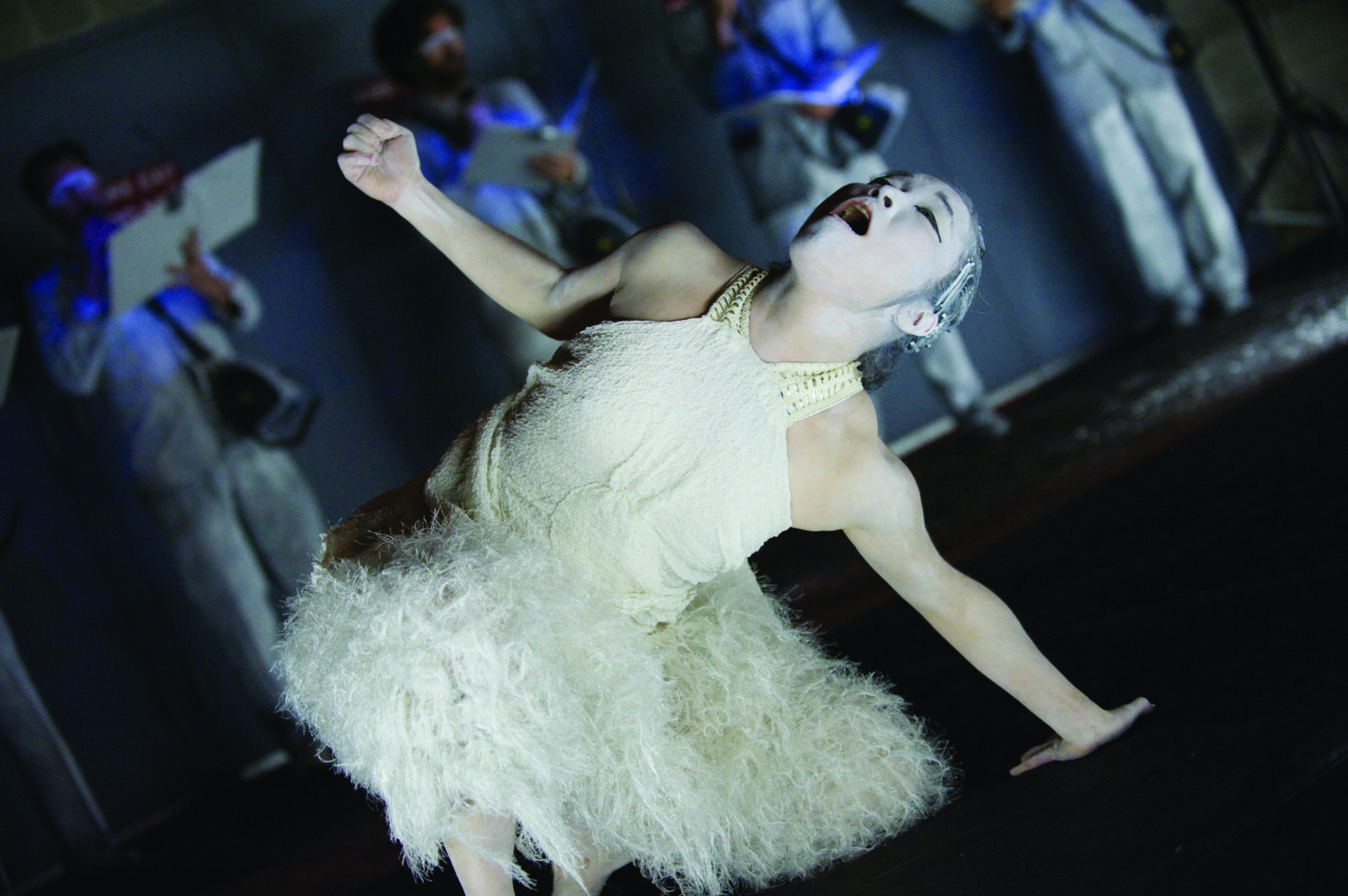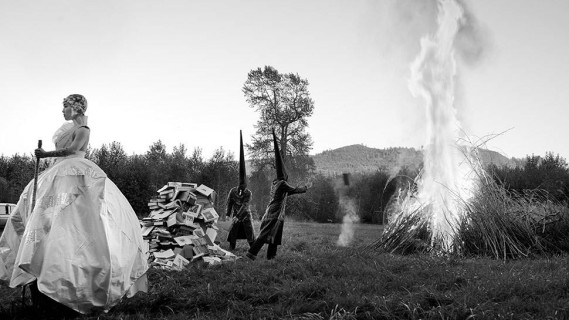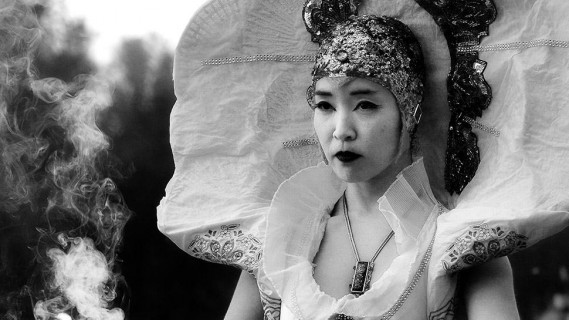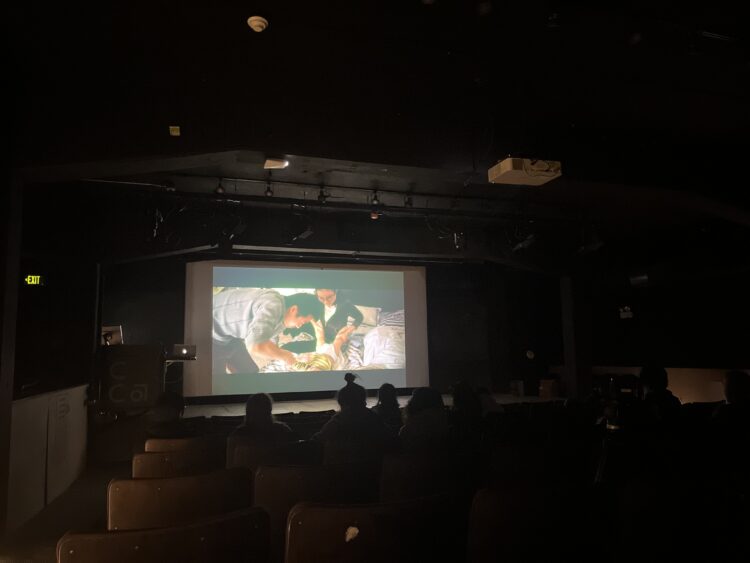Degenerate Art Ensemble’s “Predator Songstress” Finds Her Voice

The Seattle-based performance group Degenerate Art Ensemble is premiering their Creative Capital project, Predator Songstress, with upcoming engagements at Yerba Buena Center for the Arts in San Francisco and On the Boards in Seattle . Inspired by punk, comics, cinema, nightmares and fairy tales, Predator Songstress tells the story of a modern-day anti-heroine in search of her stolen voice. The piece fuses live music, dance and media to create an immersive art environment set in a world of hyper-surveillance, interrogation and data mining. Predator Songstress investigates personal power and the divine secrets of the human voice, engaging audiences in a stunning theatrical experience infused with otherworldly visuals, gorgeous vocals, incredible costumes and a singular butoh-meets-anime vision.

Degenerate Art Ensemble, “Predator Songstress.” Photo by Joe Iano.
Degenerate Art Ensemble (DAE) is led by co-founders and co-artistic directors Joshua Kohl and Haruko Crow Nishimura. Jenny Gill connected with Joshua and Crow to learn more about this ambitious performance event.
Jenny Gill: Predator Songstress centers on a female character (played by Crow) whose voice has been stifled by societal forces. Can you talk about the oppressive forces or societal issues behind this concept that you want to bring to the foreground? In the end, how does the character find her voice and expression?
Haruko Crow Nishimura: There is a central female character in this modern fairy tale named Ximena, who is growing up in a totalitarian state, where the public sharing of people’s personal stories and struggles centering around voice are strictly forbidden. Her obsession with people’s stories and the source of people’s power gets her into deep trouble. She is sent away to a women’s penal colony and has her voice removed.

Haruko Crow Nishimura as Ximena in Degenerate Art Ensemble’s “Predator Songstress.” Photo by Joe Iano.
Joshua Kohl: Behind this tale, we have been thinking about the ways in which every person is struggling with the loss, rediscovery and realization of their voice, and how this process is a reality for everyone despite the conditions of their life, whether it be, homelessness, being under the thumb of a corporation, living within a patriarchal power structure, religious confines, surviving under constant oppression or bullying—or even getting lost in the over-saturation of voices in our current digital world. We find that the journey of the voice is a continual death and rebirth; it is never found forever. It will be lost again, and more work is needed to rediscover it.
Crow: Often the things we are so desperately trying to find are already within us, and sometimes it takes an enormous loss or shock or upheaval to awaken it. As our main character goes through these cycles, the biggest question we pose is: once we have this new found power, what do we do with it? When we find our voice, it is a beginning.
Jenny: You received the Creative Capital Award for this project two years ago, in 2013. You mentioned in your presentation at the CC Artist Retreat that you did extensive work before going into production to connect with individuals who often don’t have a voice in our society, to draw out their stories and incorporate them into the work. How did that process shape the final form of the work? Did it evolve or grow in unexpected ways?
Joshua: When we begun work on this piece, since we were thinking about voice, we felt it was very important to incorporate more voices than our usual art-going audience. Having a long history of site-specific performance, we know the power of intersecting with people who normally would never have the opportunity to experience our work. For this project, we reached out to two INCREDIBLE organizations, one in Seattle and one in San Francisco, who provide art experiences to people recovering from homelessness, addiction and trauma (and some who are still in the midst of homelessness). These are people with a tremendous amount of life experience, but voices that are seldom heard in our society. With Seattle’s Path With Art (PWA) and San Francisco’s Central City SRO Collaborative (CCSROC), we led workshops on the discovery of voice, the skills of interviewing, and soulful communication. We ultimately trained the workshop participants to become our interviewers in the performance itself; they actually interview members of the audience on the ways in which they were able to break through their barriers and discover their voice. This footage then gets woven into the performance.
Crow: We actually call these interviews “interrogations.” We are finding ways of re-appropriating totalitarian tools (interrogation, surveillance, data collection) and using them for tools of transformation, empowerment and awakening. For us all to witness the common struggles as well as extreme differences that both disenfranchised and privileged people in our society face is a very powerful opportunity to learn from each other. The courage and the uniqueness in their stories and the wisdom that has been shared in these conversations has been deeply transformative for us as artists and, we’ve heard, for the participants as well.
Joshua: Predator Songstress is a work of “faction”—the story is a fiction that we have created, but we are weaving true words and stories, inspirations from the people who have interacted and contributed into the piece. Mythologies, archetypes and fairytales are universal and help the viewer to experience the more difficult subjects of our everyday lives—brutality or tragedies. We are sometimes able to more easily receive their message than simulating factual reenactments. Here we try to do some of both within the same performance context. We are trying to represent universal truths that can release the power of the psyche that is already living deep within each of us.
VIDEO: Degenerate Art Ensemble presents “Predator Songstress” at the 2015 Creative Capital Artist Retreat
Jenny: DAE is known for ambitious, highly visual productions created in collaboration with an extensive creative team including architects, filmmakers, musicians and set designers. This chapter of Predator Songstress sounds especially immersive and complex. Can you talk about the components of the piece and the primary collaborations that went into the production?
Joshua: This project has had the most intensive video production that we have ever undertaken. In collaboration with our video team—Ian Lucero (cinematographer), Leo Mayberry (video projection and scene direction) and Elizabeth Jameson (video production design)—we created a series of films that appear throughout the production. On stage there are only two actor/dancers, but there is a cast of 20 via the video elements of the show. The video was shot on location at multiple sites across Washington and Oregon, including two 19th-century military forts, a defunct nuclear power plant, a GMO tree farm—altogether setting the scene of our totalitarian landscape. In addition, our ongoing collaborators Olson Kundig Architects are fusing these sites together in 3D-modeled landscapes that paint the larger geographic contexts. These elements are projected on a 32 foot wide screen and a series of smaller rolling screens on stage.
Crow: We are also thrilled to be working with scenic designer Neal Wilkinson (Builders Association and many more) who has been deeply involved in the evolution of this work. As always, our costumer Alenka Loesch has been dressing the multitude of bodies that appear both in film and on stage for the work. The work also pushes our exploration of audience involvement to new places with live video feeds and manual typewriter data collection, among other methods.
Jenny: Do you have any advice for young artists and performers just starting out?
Crow: To follow the curiosity and strong desires, even though some things might be scary or doesn’t quite fit with the original plans. And if there is a strong gut feeling, following it wherever it goes. And start sharing with the people who want to hear what you do, support what you do and work with you.
Degenerate Art Ensemble premieres “Predator Songstress” at Yerba Buena Center for the Arts in San Francisco and On the Boards in Seattle.
